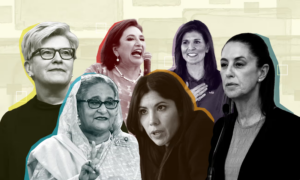More People Will Vote in 2024 Than Ever Before – But Where are the Female Candidates?
Originally published by Jonathan Yerushalmy and Ashifa Kassam for the Guardian
With more people set to vote in elections than at any time in history, 2024 is being touted as a test of democracies’ strength around the world, but one thing remains in noticeably short supply – female leadership candidates.
Analysis from the Guardian shows that of the 42 elections – both presidential and parliamentary – in which the country’s leader is being selected and where candidates have been declared, just 18 have women in the running to be leader. In just a handful of countries do women have a reasonable chance of winning – based on polling averages and the historical results of the parties they are running for.
With a combined population of more than two billion, elections in the world’s biggest democracies – the US, Indonesia and India – have, or had, no female frontrunners. The same is true of votes in the UK, Pakistan and South Africa.
The challenges faced by female politicians are perhaps best exemplified in the United States – the world’s richest country – where female representation in politics still lags behind many other wealthy nations. Hillary Clinton made history as the first woman to win her party’s nomination in 2016 – while Kamala Harris became the country’s first female vice-president in 2021 – but Republicans had to wait until March 2024 for a woman to win a state primary, with Nikki Haley’s victory in Vermont coming less than 24 hours before she suspended her presidential campaign.
Polling shows that in general, Americans are open to electing a female leader. A 2023 survey from Pew Research found that 53% of the population say there are too few women in high political offices, while 81% accept that female politicians have to do more to prove themselves than their male peers.
But when it comes to why voters continually fail to select female candidates, studies show that their stated reasons are often more nuanced – and therefore harder to combat.
